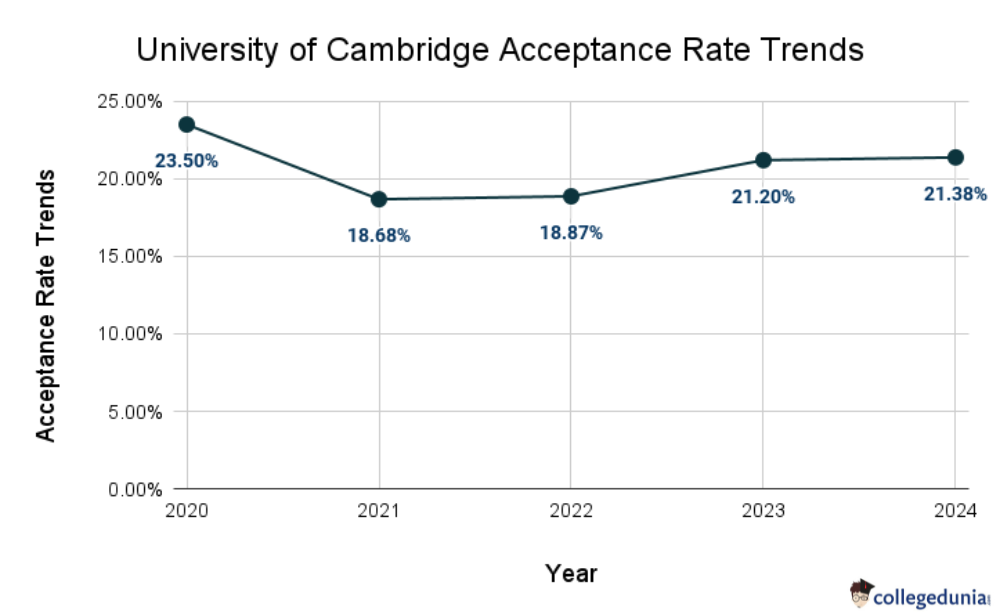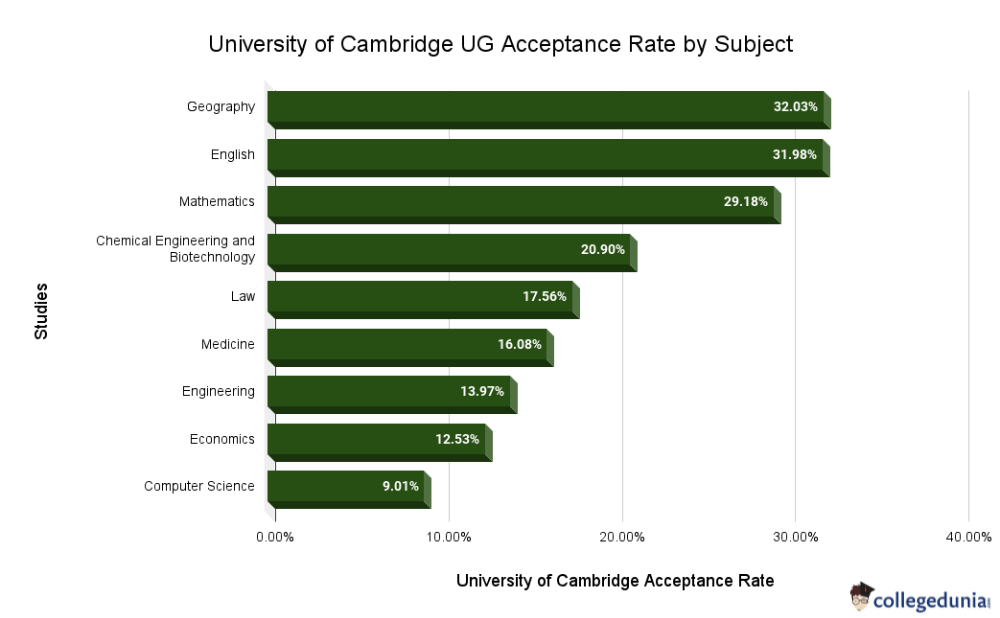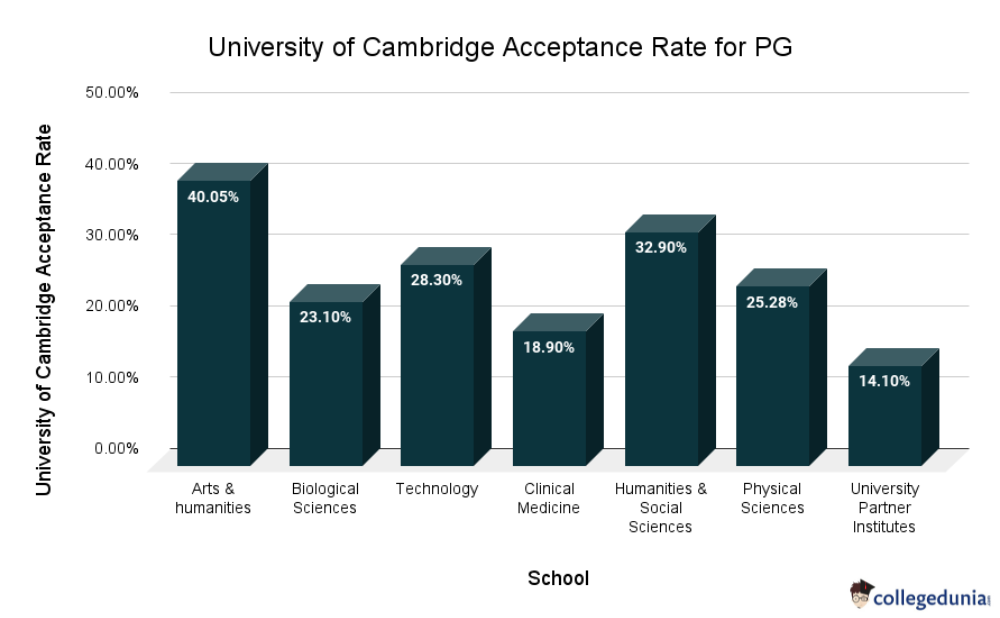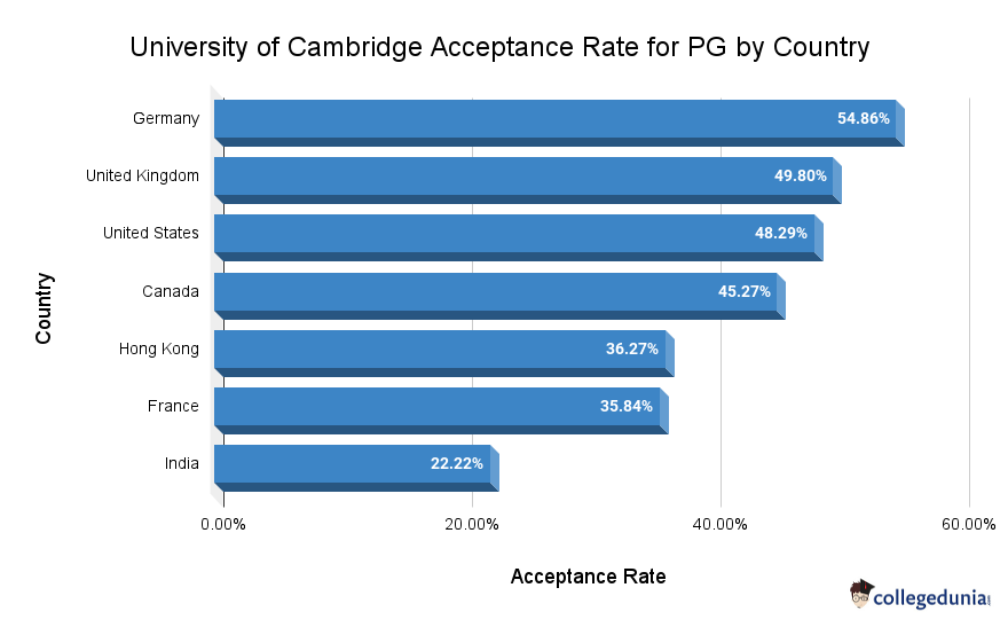The University of Cambridge acceptance rate 2025 is 21.38% based on the 2024-25 admission cycle data. Out of 22,153 applications received, around 4,760 students were offered admission, highlighting the university’s highly selective admission process.
According to the latest Cambridge admissions statistics, approximately 3,632 students accepted their offers and enrolled at the university, resulting in a yield rate of 76.3%. These figures reflect Cambridge’s continued position as one of the most competitive institutions in the world, attracting top-performing students from across the globe.
The Cambridge University acceptance rate has remained relatively stable over the past few years, hovering around 21%. However, the Cambridge acceptance rate for international students is even lower — approximately 15.4%, with only 1,180 of over 7,600 applicants admitted in the 2024 cycle. This makes it one of the toughest universities for Indian students seeking to study in UK.
Despite the tough competition, Cambridge offers a fair and holistic admission process that assesses each candidate’s academic record, test scores, and personal achievements to identify students with outstanding potential and intellectual curiosity.
Also Check: UK Universities with High Acceptance Rate
University of Cambridge Acceptance Rate for Undergraduate Admissions
The University of Cambridge acceptance rate for undergraduate programs is 21.38%. Out of 22,153 total applications, approximately 4,760 students were offered admission, showing a slight increase from the previous year’s 21.2%.
According to official Cambridge admissions statistics, the Cambridge University acceptance rate for undergraduate programs has remained steady over the past five years, typically fluctuating between 18% and 23%. The trend demonstrates that while Cambridge maintains rigorous academic standards, the overall acceptance rate has stabilized, giving students a clearer idea of what to expect in upcoming application cycles.

University of Cambridge Subject-Wise Acceptance Rate
The table below highlights subject-wise Cambridge acceptance rates for undergraduate programs. Some of the most competitive courses include Computer Science, Medicine, and Law, while programs such as English and Geography show comparatively higher acceptance ratios.
| Studies | Applications Received | Application Accepted | Acceptance Rate |
|---|---|---|---|
| Chemical Engineering and Biotechnology | 421 | 88 | 20.90% |
| Computer Science | 1863 | 168 | 9.01% |
| Economics | 1571 | 197 | 12.53% |
| Engineering | 2654 | 371 | 13.97% |
| English | 719 | 230 | 31.98% |
| Geography | 437 | 140 | 32.03% |
| Law | 1640 | 288 | 17.56% |
| Mathematics | 1840 | 537 | 29.18% |
| Medicine | 1791 | 288 | 16.08% |

As seen above, the Cambridge Law acceptance rate is 17.6%, while the Cambridge Medicine acceptance rate stands at 16.1% — both reflecting the university’s selective nature in professional and competitive disciplines. The Cambridge Engineering acceptance rate, at 13.97%, shows a similarly rigorous entry standard, attracting high-performing STEM students globally.
Overall, the Cambridge undergraduate acceptance rate continues to hover near 21%, showing that strong academics, a compelling personal statement, and exceptional interview performance remain key factors for securing admission.
University of Cambridge Acceptance Rate for PG
The University of Cambridge acceptance rate for postgraduate programs is approximately 29.1%. According to the latest Cambridge admissions statistics, the university received around 33,500 postgraduate applications, out of which nearly 9,780 students were offered admission across various departments and research programs.
While this figure reflects a higher acceptance rate compared to undergraduate admissions, the selection process remains highly competitive — particularly in professional and research-intensive programs. The Cambridge University acceptance rate for postgraduate studies varies by discipline, with Arts & Humanities and Technology streams showing slightly higher acceptance ratios than Medicine and Partner Institutes.
| School | Number of Applications | Number of Acceptance | University of Cambridge Acceptance Rate |
|---|---|---|---|
| Arts & humanities | 3396 | 1374 | 40.05% |
| Biological Sciences | 2320 | 535 | 23.1% |
| Technology | 7989 | 2263 | 28.3% |
| Clinical Medicine | 3012 | 570 | 18.9% |
| Humanities & Social Sciences | 11072 | 3647 | 32.9% |
| Physical Sciences | 5209 | 1317 | 25.28% |
| University Partner Institutes | 538 | 76 | 14.1% |
| Total | 33536 | 9782 | 29.16% |
These numbers illustrate that the Cambridge postgraduate acceptance rate varies widely across academic divisions. Fields such as Arts & Humanities (40%) and Humanities & Social Sciences (33%) have comparatively higher acceptance ratios, while areas like Clinical Medicine (18.9%) and University Partner Institutes (14%) remain among the most selective.

University of Cambridge Acceptance Rate for PG by Country
The University of Cambridge continues to attract students from more than 140 countries. For the 2024–25 cycle, the Cambridge acceptance rate for international postgraduate applicants varied significantly by region.
| Country | Applications Received | Applications Accepted | Acceptance Rate |
|---|---|---|---|
| United Kingdom | 3855 | 1925 | 49.8% |
| China | 6057 | 1228 | 20.27% |
| United States | 1814 | 876 | 48.29% |
| India | 1615 | 359 | 22.22% |
| Canada | 444 | 201 | 45.27% |
| Germany | 401 | 220 | 54.86% |
| France | 332 | 119 | 35.84% |
| Hong Kong | 295 | 107 | 36.27% |

This data highlights the university’s diverse academic environment, with nearly 42% of the total student body representing international students. However, competition remains intense, as the Cambridge acceptance rate for international students hovers around 15%–20%, depending on the country and program. Specifically, the Cambridge University acceptance rate for Indian students is around 22%.
The University of Cambridge acceptance rate has remained relatively consistent over the past five years, reflecting a steady level of selectivity across both undergraduate and postgraduate admissions. Between 2020 and 2025, the number of total applications ranged between 20,400 and 22,400, while admitted students numbered around 4,200 to 4,760 annually.
Check Out: Cambridge University Reviews
According to official Cambridge admissions statistics, the Cambridge University acceptance rate 2025 stands at 21.4%, slightly higher than in 2023 and 2022, when it dipped below 19%. This stability indicates that the university maintains a constant admission threshold despite fluctuations in global applicant volume.
When comparing Cambridge vs Oxford acceptance rates, both universities exhibit a similar level of competitiveness. The University of Oxford acceptance rate currently stands at approximately 17%, while the Cambridge University acceptance rate is slightly higher at 21.4%.
FAQs
Ques. Is it hard to get into the University of Cambridge?
Ans. With highly competitive admissions and acceptance rate of 21.38%, getting into University of Cambridge is hard. However, applicants can improve their admission chances if they possess a strong academic background and achieve higher in the admission test. Additionally, applicants must also provide written work with their application.
Ques. What GPA do you need for the University of Cambridge?
Ans. International students require a 2:1 bachelor’s degree with 70-75% aggregate for admissions in postgraduate courses. Undergraduate applicants must achieve at least 90% in senior secondary education to probe their eligibility for admissions at University of Cambridge.
Ques. How do I get to the University of Cambridge from India?
Ans. Indian applicants must hold 3-4 year bachelor’s for PG admissions or 10+2 qualification for UG admissions at University of Cambridge.
- Postgraduate applicants must achieve at least 70-75% in bachelor's degree along with high scores in l GMAT/GRE/MCAT or course related tests
- Undergraduate applicants from India must have 90% in CISCE, A1 grades in CBSE or 95% in State board 10-2 exams. UG applicants must provide satisfactory test scores of SAT/ACT/JEE or other course relevant tests for admissions.
- Postgraduate applicants may apply directly using the PG application form while UG applicants can apply through My Cambridge application or UCAS.














Comments